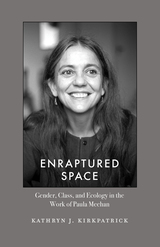17 start with P start with P
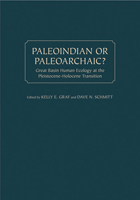
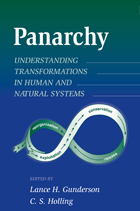
Creating institutions to meet the challenge of sustainability is arguably the most important task confronting society; it is also dauntingly complex. Ecological, economic, and social elements all play a role, but despite ongoing efforts, researchers have yet to succeed in integrating the various disciplines in a way that gives adequate representation to the insights of each.
Panarchy, a term devised to describe evolving hierarchical systems with multiple interrelated elements, offers an important new framework for understanding and resolving this dilemma. Panarchy is the structure in which systems, including those of nature (e.g., forests) and of humans (e.g., capitalism), as well as combined human-natural systems (e.g., institutions that govern natural resource use such as the Forest Service), are interlinked in continual adaptive cycles of growth, accumulation, restructuring, and renewal. These transformational cycles take place at scales ranging from a drop of water to the biosphere, over periods from days to geologic epochs. By understanding these cycles and their scales, researchers can identify the points at which a system is capable of accepting positive change, and can use those leverage points to foster resilience and sustainability within the system.
This volume brings together leading thinkers on the subject -- including Fikret Berkes, Buz Brock, Steve Carpenter, Carl Folke, Lance Gunderson, C.S. Holling, Don Ludwig, Karl-Goran Maler, Charles Perrings, Marten Scheffer, Brian Walker, and Frances Westley -- to develop and examine the concept of panarchy and to consider how it can be applied to human, natural, and human-natural systems. Throughout, contributors seek to identify adaptive approaches to management that recognize uncertainty and encourage innovation while fostering resilience.
The book is a fundamental new development in a widely acclaimed line of inquiry. It represents the first step in integrating disciplinary knowledge for the adaptive management of human-natural systems across widely divergent scales, and offers an important base of knowledge from which institutions for adaptive management can be developed. It will be an invaluable source of ideas and understanding for students, researchers, and professionals involved with ecology, conservation biology, ecological economics, environmental policy, or related fields.
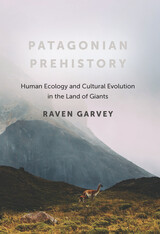
Garvey’s novel hypotheses question common assumptions regarding Patagonia’s suitability for prehistoric hunter-gatherers. She makes four primary arguments: (1) the surprising lack of clothing in parts of prehistoric Patagonia supports a relatively slow initial colonization of the Americas; (2) the sparse record of human habitation during the middle Holocene may be due to prehistoric behavioral changes and archaeological sampling methods rather than population decline; (3) farming never took root in Patagonia because risks associated with farming likely outweighed potential benefits; and, finally, (4) the broad trajectory of cultural change in Patagonia owes as much to feedback between population size and technology as to conditions in the rugged Patagonian outback itself.

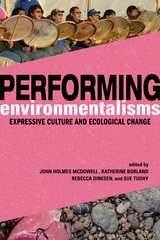
Interdisciplinary in approach and wide-ranging in scope, Performing Environmentalisms is an engaging look at the merger of cultural expression and environmental action on the front lines of today's global emergency.
Contributors: Aaron S. Allen, Eduardo S. Brondizio, Assefa Tefera Dibaba, Rebecca Dirksen, Mary Hufford, John Holmes McDowell, Mark Pedelty, Jennifer C. Post, Chie Sakakibara, Jeff Todd Titon, Rory Turner, Lois Wilcken
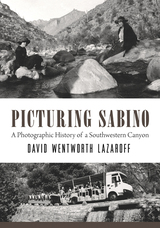
The story is vividly told through numerous historical photographs, lively anecdotes, and an engaging text, informed by decades of research by David Wentworth Lazaroff. Along the way the reader makes the acquaintance of ordinary picnickers as well as influential citizens who helped to reshape the canyon, while witnessing the canyon’s evolving relationship with its growing urban neighbor. The book will fascinate readers who are already familiar with Sabino Canyon, as well as anyone with an interest in local or regional history, or in historical photography.

Where and what is the place of the wild? Is the goal of preserving biodiversity across the landscape of North America compatible with contemporary Western culture?
Place of the Wild brings together original essays from an exceptional array of contemporary writers and activists to present in a single volume the most current thinking on the relationship between humans and wilderness. A common thread running through the volume is the conviction that everyone concerned with the natural world -- academics and activists, philosophers and poets -- must join forces to re-establish cultural narratives and shared visions that sustain life on this planet.
The contributors apply the insights of conservation biology to the importance of wilderness in the 21st century, raising questions and stimulating thought. The volume begins with a series of personal narratives that present portraits of wildlands and humans. Following those narratives are more-analytical discourses that examine conceptions and perceptions of the wild, and of the place of humanity in it. The concluding section features clear and resonant activist voices that consider the importance of wildlands, and what can be done to reconcile the needs of wilderness with the needs of human culture.
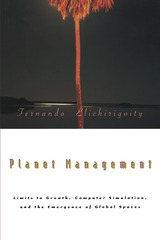
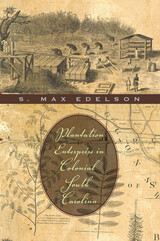
This impressive scholarly debut deftly reinterprets one of America's oldest symbols--the southern slave plantation. S. Max Edelson examines the relationships between planters, slaves, and the natural world they colonized to create the Carolina Lowcountry.
European settlers came to South Carolina in 1670 determined to possess an abundant wilderness. Over the course of a century, they settled highly adaptive rice and indigo plantations across a vast coastal plain. Forcing slaves to turn swampy wastelands into productive fields and to channel surging waters into elaborate irrigation systems, planters initiated a stunning economic transformation.
The result, Edelson reveals, was two interdependent plantation worlds. A rough rice frontier became a place of unremitting field labor. With the profits, planters made Charleston and its hinterland into a refined, diversified place to live. From urban townhouses and rural retreats, they ran multiple-plantation enterprises, looking to England for affirmation as agriculturists, gentlemen, and stakeholders in Britain's American empire. Offering a new vision of the Old South that was far from static, Edelson reveals the plantations of early South Carolina to have been dynamic instruments behind an expansive process of colonization.
With a bold interdisciplinary approach, Plantation Enterprise reconstructs the environmental, economic, and cultural changes that made the Carolina Lowcountry one of the most prosperous and repressive regions in the Atlantic world.
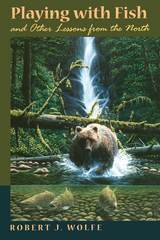

With contributions by Paul Bloom, Helen Sorayya Carr, Edward S. Deevey, Jr., Nancy L. Hamblin, S. E. Garrett-Jones, Hattula Moholy-Nagy, Mary Pohl, Amadeo M. Rea, Don S. Rice, Prudence M. Rice, Julie Stein, B. L. Turner II, Hague H. Vaughan, Richard R. Wilk, Frederick Matthew Wiseman
This volume provides data from interdisciplinary projects produced over the past fifteen years, including palynology, limnology, geography, soil science, faunal analysis, ethnology, and ethnohistory. Centering on differences of opinion rather than on a synthesis of data, this analysis of the methods and theoretical principles by which specialists work yields a unique view of archaeological procedures.

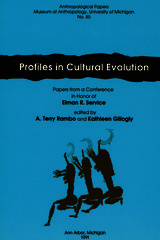

Arguing that the environmental movement has the potential to contribute to contemporary developments in political theory and social action by changing discursive practices both at the grassroots level and along the corridors of power, Torgerson draws on the theories of Hannah Arendt and others to advocate a performative type of political debate that values multiple opinions and is not always oriented toward reaching a single conclusion. Torgerson argues that in a world stuck in administrative and scientific gridlock, the theatrical, comic aspects of green politics are as important as other, more goal-oriented, aspects. Gestures of the carnivalesque—such as protestors sleeping in hammocks slung from trees targeted for destruction or funeral processions held for dying rivers—could be the key to the creation of what Torgerson refers to as a “green public sphere,” one that promises a reconfiguration of the relationship between human creativity and the natural world. While offering a number of concrete policy suggestions, his focus remains on the complexity and heterogeneity of green thinking and on the transformative promise implicit in green politics. In creating new ways to speak about the environment, Torgerson argues, the green movement offers a creative way to reconsider many larger issues of political theory and action.
The Promise of Green Politics will serve as a gateway to new thinking about green politics and the emerging possibilities of a diverse and vital green public sphere. As such, it will be valued by those interested in environmental and public policy, political theory, social activism, and the future of political action.
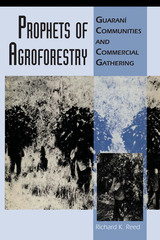
For almost four centuries, the indigenous Chiripá (Guaraní) people of eastern Paraguay have maintained themselves as a distinct society and culture, despite continual and often intense relations with Paraguayan society and the international economy. In this study, Richard K. Reed explores the economic and social basis for this ethnic autonomy.
Reed finds that Chiripá economic power derives from their practice of commercial agroforestry. Unlike Latin American indigenous societies that have been forced to clear land for commercial agriculture, the Chiripá continue to harvest and sell forest products, such as caffeinated yerba mate, without destroying the forests. Reed also explores the relation of this complex economy to Chiripá social organization and shows how flexible kin ties allowed the Chiripá to adapt to the pressure and opportunities of the commercial economy without adopting the authoritarian nature of rural Paraguayan society.
These findings offer important insights into the relations among indigenous groups, nation-states, and the international economy. They also provide a timely alternative model for sustainable management of subtropical forests that will be of interest in the fields of development and environmental studies.
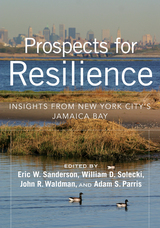
Prospects for Resilience establishes a framework for understanding resilience practice in urban watersheds. Using Jamaica Bay—the largest contiguous natural area in New York, home to millions of New Yorkers, and a hub of global air travel with John F. Kennedy International Airport—the authors demonstrate how various components of social-ecological systems interact, ranging from climatic factors to plant populations to human demographics. They also highlight essential tools for creating resilient watersheds, including monitoring and identifying system indicators; computer modeling; green infrastructure; and decision science methods. Finally, they look at the role and importance of a “boundary organization” like the new Science and Resilience Institute at Jamaica Bay in coordinating and facilitating resilience work, and consider significant research questions and prospects for the future of urban watersheds.
Prospects for Resilience sets forth an essential foundation of information and advice for researchers, urban planners, students and others who need to create more resilient cities that work with, not against, nature.
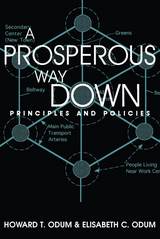
A Prosperous Way Down considers ways in which a future with less fossil fuel could be peaceful and prosperous. Although history records the collapse of countless civilizations, some societies and ecosystems have managed to descend in orderly stages, reducing demands and selecting and saving what is most important.
The authors make recommendations for a more equitable and cooperative world society, with specific suggestions based on their evaluations of trends in global population, wealth distribution, energy sources, conservation, urban development, capitalism and international trade, information technology, and education.
Available for the first time in paperback, this thoughtful, provocative book forces us to confront assumptions about our world 's future and provides both a steadying hand and a call to action with its pragmatic analysis of a global transition.
READERS
Browse our collection.
PUBLISHERS
See BiblioVault's publisher services.
STUDENT SERVICES
Files for college accessibility offices.
UChicago Accessibility Resources
home | accessibility | search | about | contact us
BiblioVault ® 2001 - 2025
The University of Chicago Press



